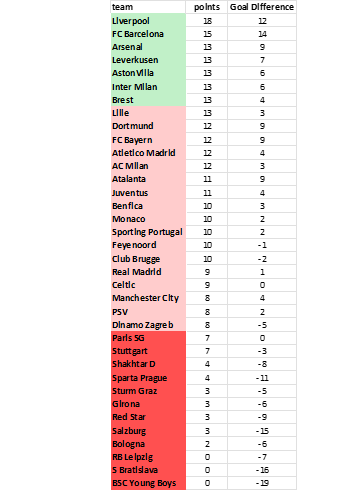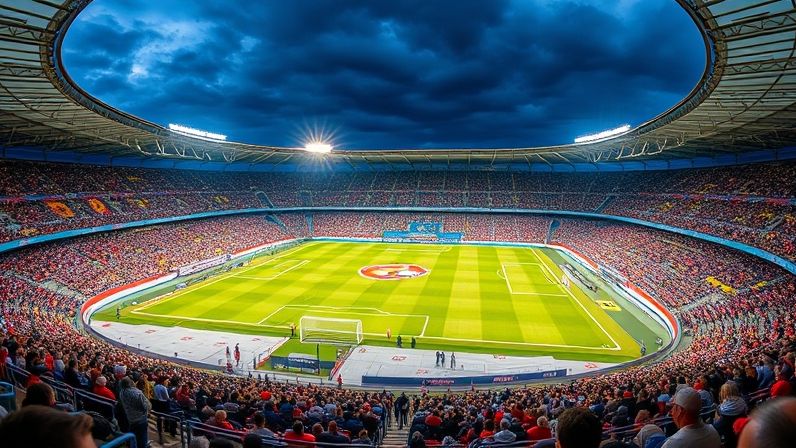why soccer is such a popular sport
An important reason is that individual games are highly influenced by chance because the number of points (goals) scored is rather low. In Basketball for example scores are much higher and as a result the probability of the best team winning an individual game is higher than in soccer. In this blog we take a look at the Champions league and use the data of the matches played in the first six rounds to make some predictions about the outcome of the poule phase. Our goal here is not to predict individual outcomes of games, but to conclude about some effects that are related to the new competition format that the UEFA introduced this year.
This year, the UEFA decided to change the format of the Champions League competition. In the new format, 36 teams play 8 games against different opponents and based on the ranking after those 8 rounds, the first 24 teams proceed in a next round and 25th-36th ranked are eliminated. For all teams, it’s crucial to be in that group of 24. The first 8 ranked teams have an additional advantage, they immediately go to the knock-out phase, while teams ranked 9-24 have to play an extra round in between.
The effect of this competition format is that the strength of the opponents you face in the first 8 matches highly influences the probability of making it to the second phase. The UEFA is aware of this effect and therefore, they classified all 36 teams into 4 groups (9 teams each) of comparable strength based on historical results. So Group 1 is considered to have the 9 strongest teams and Group 4 the 9 weakest teams. With the boundary condition that every team will play against 2 teams from each group, the UEFA aims to ensure that all teams face an equal number of stronger and weaker opponents over 8 matches.
On December 11th, round 6 of the competition ended and based on the results of the 108 matches played, we try to answer the following questions
- Which teams are expected to get into the second round?
- Which teams have a serious (dis)advantage with the 8 opponents they have to play against in the first round?
But first, we briefly describe the method used.
Advantage of a home game
In 2008 professor Ruud Koning published (in Dutch) an analysis of Dutch Eredivisie with the objective of quantifying the effect home advantage in that soccer competition. This model is the foundation of our approach. This model contains the following ingredients for all the games played thus far in the competition.
- Game result described by the goals difference (GoalDif)
- So if the home team wins with 3-1, GoalDif=2 and if the away team wins with 0-2, GoalDif=-2.
- The strength of every team interpreted as the expected average GoalDif against an average team on neutral ground referred to as TeamStrength.
- The home advantage of each team described by HomeAdv.
- Chance; the fact that every individual match result is also influenced by other factors than the strength of the two teams and the home advantage of the team playing at home.
The model can be formulated as - for every two teams i and j in the competition with team i playing at home.
GoalDifij = TeamStrengthi – TeamStrengthj + HomeAdvi + Changeij
The data to estimate the strength and home advantage of all teams consists of the results of the already played games in the competition. With Ordinary Least Squares (OLS) the estimates of these team strengths and home advantages can be obtained easily, helping us in answering our questions.
NOTE: In 2020, the year in which corona made it impossible to finalize most sports competitions, CQM developed a website that can be used to predict the final outcomes of sports competitions when all teams play two times against each other, home and away.
Ranking after round 6

Our predictions
In the current ranking PSV will be just safe with the 24th position in the ranking and for example Paris SG would be eliminated. Furthermore, a highly ranked team as Bayern Munchen would have to play an extra round to get into the knock-out phase. However, in the last two rounds some teams have very tough opponents and other have weak opponents, which can result in some, perhaps unexpected, changes.
We expect the following changes in the final ranking:
- Aston Villa, Brest and Lille will not be ranked in the top 8 and will have to play an extra round.
- Dortmund, FC Bayern, and AC Milan will replace in the Top 8 in the ranking after 8 rounds.
- PSV and Dinamo Zagreb will not be in the top 24 and will therefore be eliminated.
- They will be replaced by Paris SG and Stuttgart.
The reason why we expect PSV to fall out of the top-24, is that Liverpool is too strong but also Red Star will be too strong in an away game. If PSV would have played against Red Star at home, it would probably win. Red Star is ranked below PSV, but Red Star has had a very tough program in the first 6 rounds. In Table 2 we describe their matches and results.
| Home team | Away team | Result |
|---|---|---|
| Red Star | Benfica | 1-2 |
| Inter Milan | Red Star | 4-0 |
| Monaco | Red Star | 5-1 |
| Red Star | Barcelona | 2-5 |
| Red Star | Stuttgart | 5-1 |
| AC Milan | Red Star | 2-1 |
| Red Star | PSV | |
| BSC Young Boys | Red Star |
The only team Red Star has been played against that is ranked in the bottom-8 is Stuttgart and that game they also won quite convincingly. The teams from which they lost their games are strong teams. We expect also that Red Star will outperform PSV after 8 rounds, although it will not be enough for them to reach the final 24.
Having said this, we realize that the big effect of chance on individual outcomes makes it also possible that PSV will beat Red Star and proceeds to the next round. As said in the introduction, this is one of the main reasons why soccer is such a popular sport. And with our office in Eindhoven, we all hope that the dies will be in favor of PSV!
Which teams have had a serious (dis)advantage with the opponents they have had until now?
The teams that had the heaviest program until now are Red Star and Benfica. Table 2 shows this for Red Star, in Table 3 we show it for Benfica.
| Home team | Away team | Result |
|---|---|---|
| Red Star | Benfica | 1-2 |
| Benfica | Atletico Madrid | 4-0 |
| Benfica | Feyenoord | 1-3 |
| Bayern Munchen | Benfica | 1-0 |
| Monaco | Benfica | 2-3 |
| Benfica | Bologna | 0-0 |
| Benfica | FC Barcelona | |
| Juventus | Benfica |
The reason why we conclude that Benfica has had to tough program, is quite subtle, because most of the teams that they played against are ranked in the middle part of the ranking: FC Bayern, Atletico Madrid, Feyenoord, and Monaco. Bologna and Red Star are even ranked in the bottom part.
However, Benfica played Monaco away and won that game while Monaco is considered a strong team at home and a rather weak team away. That explains the average ranking of Monaco. Their unexpected victory against the very strong team FC Barcelona, at home, heavily influenced their home advantage estimate. And Benfica has beaten them in Monaco. Also, and that is more difficult to see, Monaco, Bayern Munchen, Red Star, and Bologna have had a tougher than average program, while only Atletico Madrid had weak competitors on average up and until Round 6.
And to elaborate on Atletico Madrid, they are considered to be the luckiest team until now with on average the weakest competitors. With Brest a second best. We expect that, if a full competition would have been played, Atletico Madrid would not reach the top 24. For Brest we expect them to fall out the top-8 ranked after 8 rounds, but that they would end up around position 20 if a full competition would be played.
After the final 8th round has been played at the end of January, we will update the analysis and see what really happened. One prediction I am 100% sure of: not everything we predict in this blog will become reality. Let us hope that this will primarily be related to PSV...
